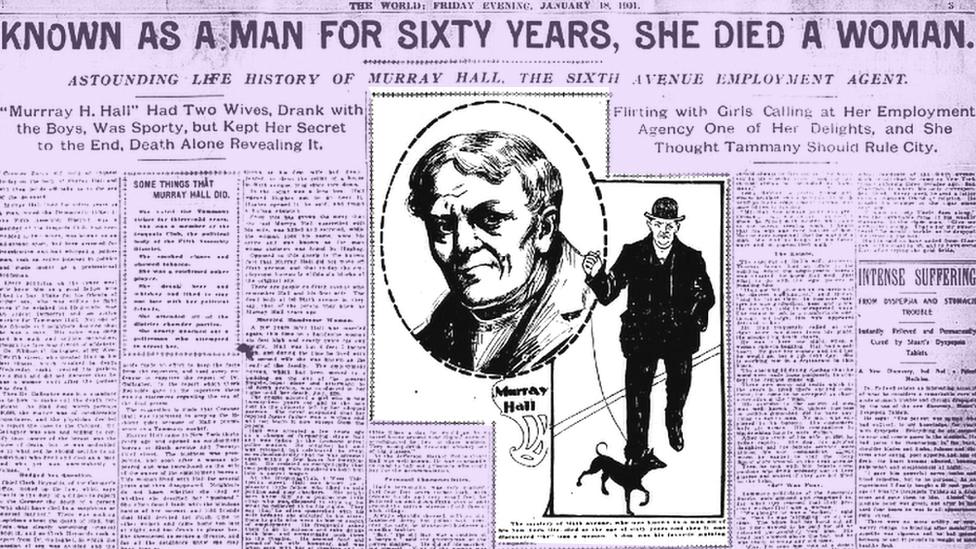Murray Hall: The New York politician who broke 19th Century gender rules
- Published

An article from the Evening World on 18 Jan 1901 (Chronicling America: Historic American Newspapers) features Murray Hall's story
He was a hard-drinking, twice-married businessman and politician in 19th Century New York - but Murray Hall had a secret which was only revealed after his death.
Now his story is being retold in Glasgow as part of an attempt to "write LGBTQI+ people back into history".
Murray Hall had a reputation for hard living - drinking, smoking, playing poker and even brawling with a policeman.
He also had an active political career and a business as a bail bondsman.
So far, so ordinary for a man at the time.
But one aspect of his life remained a secret until he died from cancer in 1901. That was when it first emerged that Hall had been assigned female at birth.
It was later reported that he had been born in Govan as Mary Anderson.
According to a source quoted by , he began dressing as a male in his teens, then fled to America when his first wife disclosed his gender to the police.
It was there that he took the name Murray H Hall, before marrying for a second time and beginning his business and political career.
Writer and archivist Mel Reeve said there had been a "huge backlash" in the media after his death.
"People were very angry and felt like they'd been betrayed, but obviously he was just living his life how he wanted to - which was as a man," she said.
The Topeka State Journal (Chronicling America: Historic American Newspapers) also carried Hall's story on 26 January 1901
Newspapers reported breathlessly on the events in articles which reflected some of the attitudes of the times.
The New York Times, for instance, .
It said Hall had a reputation as "a 'man about town', a bon vivant, and all-around 'good fellow'."
One senator described how Hall used to "hobnob with the big guns of the County Democracy" and said that he "cut quite some figure as a politician".
He added: "He dressed like a man and talked like a very sensible one."
'They felt someone was transgressing'
Another political colleague told the New York Times: "He'd line up to the bar and take his whisky like any veteran, and didn't make faces over it, either. If he was a woman he ought to have been born a man, for he lived and looked like one."
The paper said Hall "exercised considerable political influence with Tammany Hall" - a political organization which played a major role in controlling politics in New York City and New York State.
For some others, it was the knowledge that Hall had voted which rankled most at a time when women had not yet secured the right to vote in the US.
"I think they felt that someone was transgressing," added Ms Reeve.
"They were doing something that allowed them to exist in a space that they wouldn't otherwise have had access to and I think that's something we still see happen in the way that marginalised people are treated."
Murray Hall's last residence was an apartment on 6th Avenue in Greenwich Village in New York
The New York Times said Hall had suffered from breast cancer for several years, and speculated that he had not sought medical advice due to fears of his secret becoming known.
He had, however, amassed a collection of medical books which he used to treat himself.
When Hall did consult a doctor, he only had a few days left to live.
His wife had died some years previously, leaving an adopted daughter as his sole heir.
Murray Hall's story features in the new Stride with Pride heritage trail which is being launched this weekend by Glasgow Women's Library.
The library's Sue John says it is important to have a wider view in order to fully understand history and society.
Sue John says stories like that of Murray Hall help widen our view of history
"Otherwise we get a partial knowledge of history and it's almost like the default of our partial knowledge of history is it's about white men," she says.
The site of Hall's last New York residence, an apartment on 6th Avenue in Greenwich Village, is highlighted by the NYC LGBT Historic Sites Project.
"If you're a trans kid or a gender non-conforming kid today and you look back at that history and see that Murray Hall was a person living their life without the support of anyone, that's inspiring," says the project's Ken Lustbader.
"Those intangible nuggets or history and information give you a sense of connection to the past and a sense of pride and removing isolation."
Mr Lustbader, who lives near Murray Hall's former apartment, went to visit his unmarked grave at Mount Olivet Cemetery in Queens, New York, earlier this year.
Murray Hall's unmarked grave in Mount Olivet Cemetery in Queens, New York
According to the New York Times, Murray Hall was buried there in woman's clothing.
"When I was at the grave I had this little moment kind of envisioning him being buried there in women's clothing, much to his horror," said Mr Lustbader.
"I just felt I was sending a message to Murray Hall saying don't worry, people know your story and you are not being mocked any longer.
"You're being recognised for the contribution you've made and to your own personal struggle and what you've succeeded in doing - living as a man, as you so choose."
All images subject to copyright.